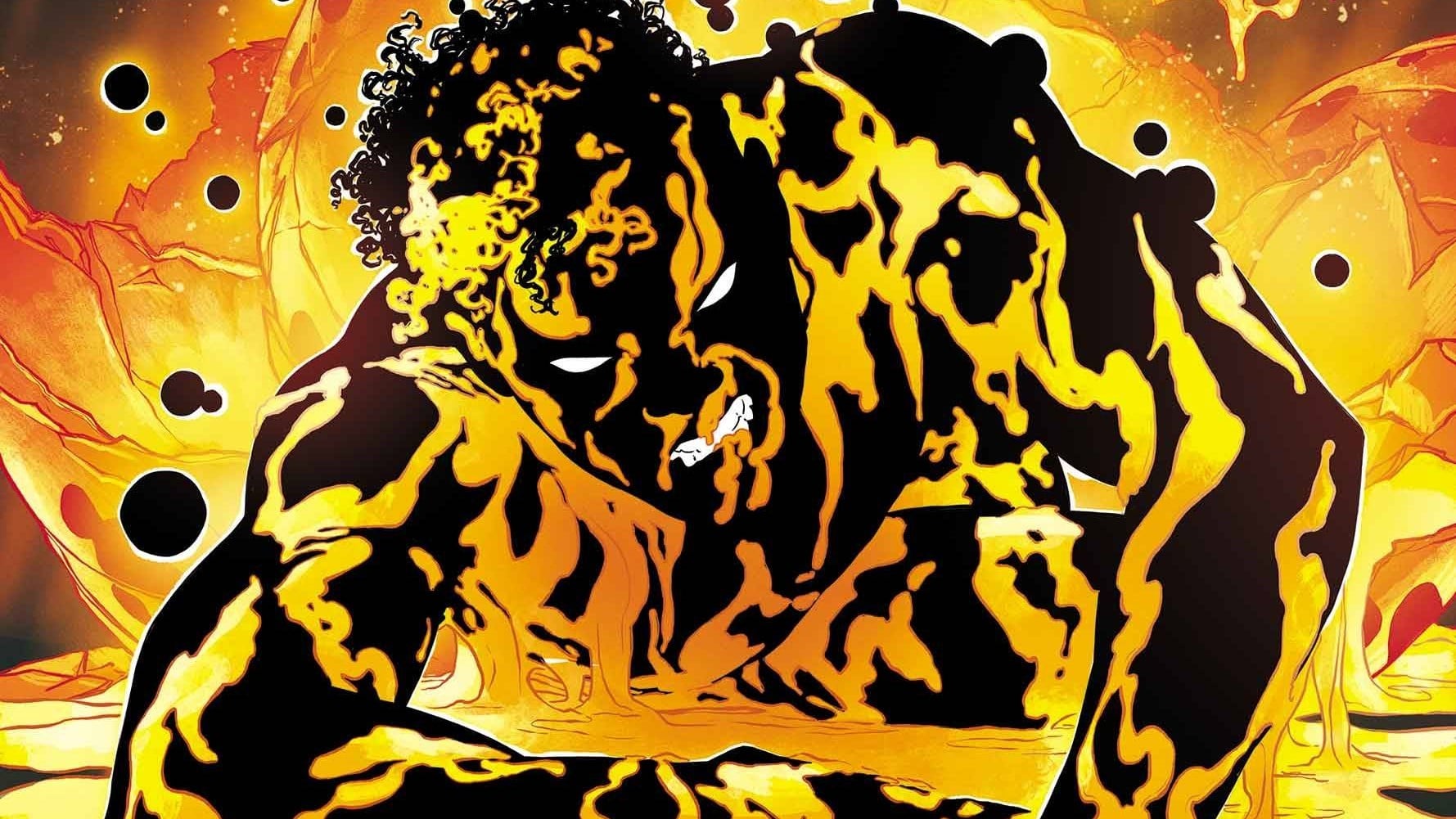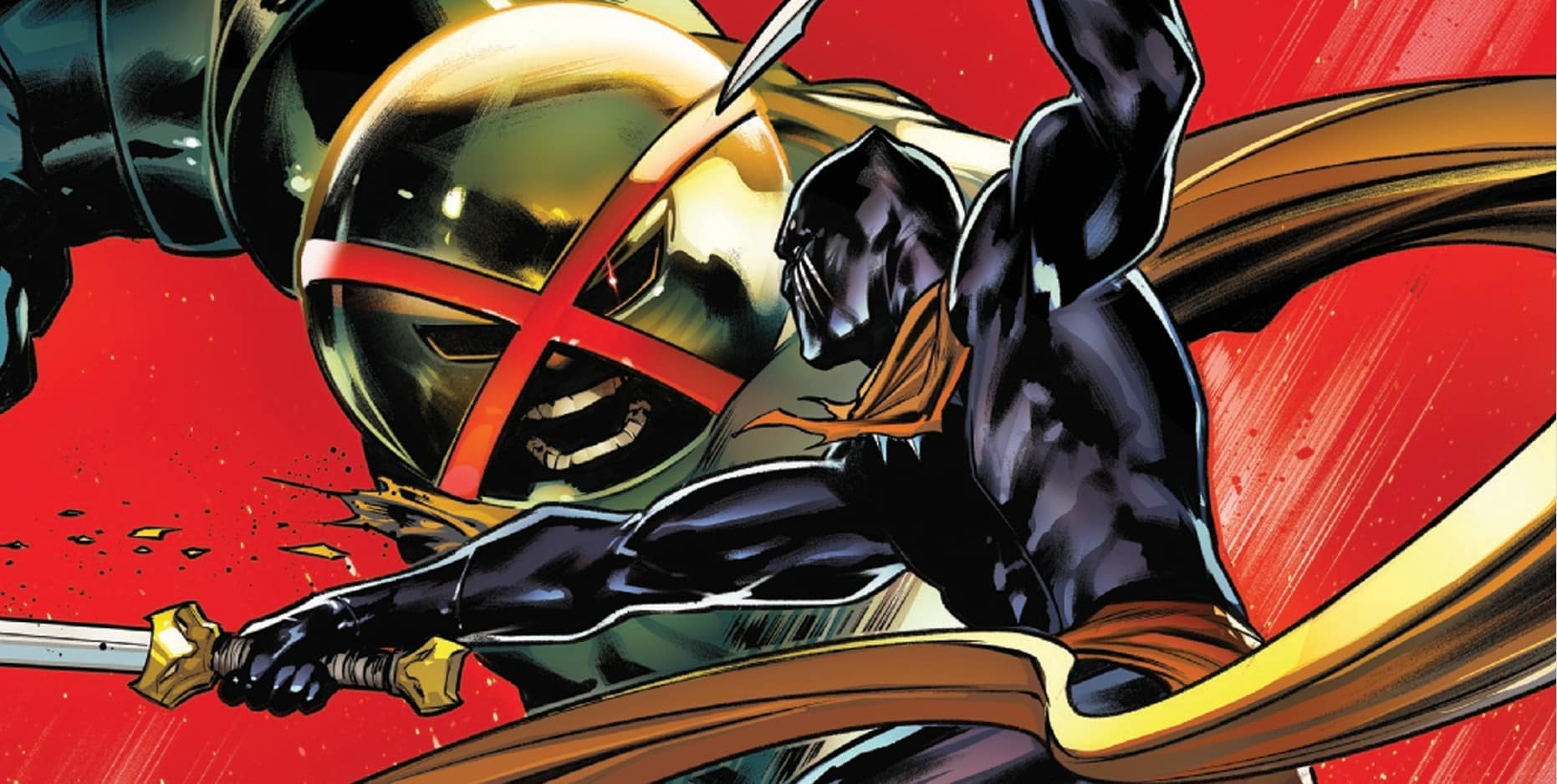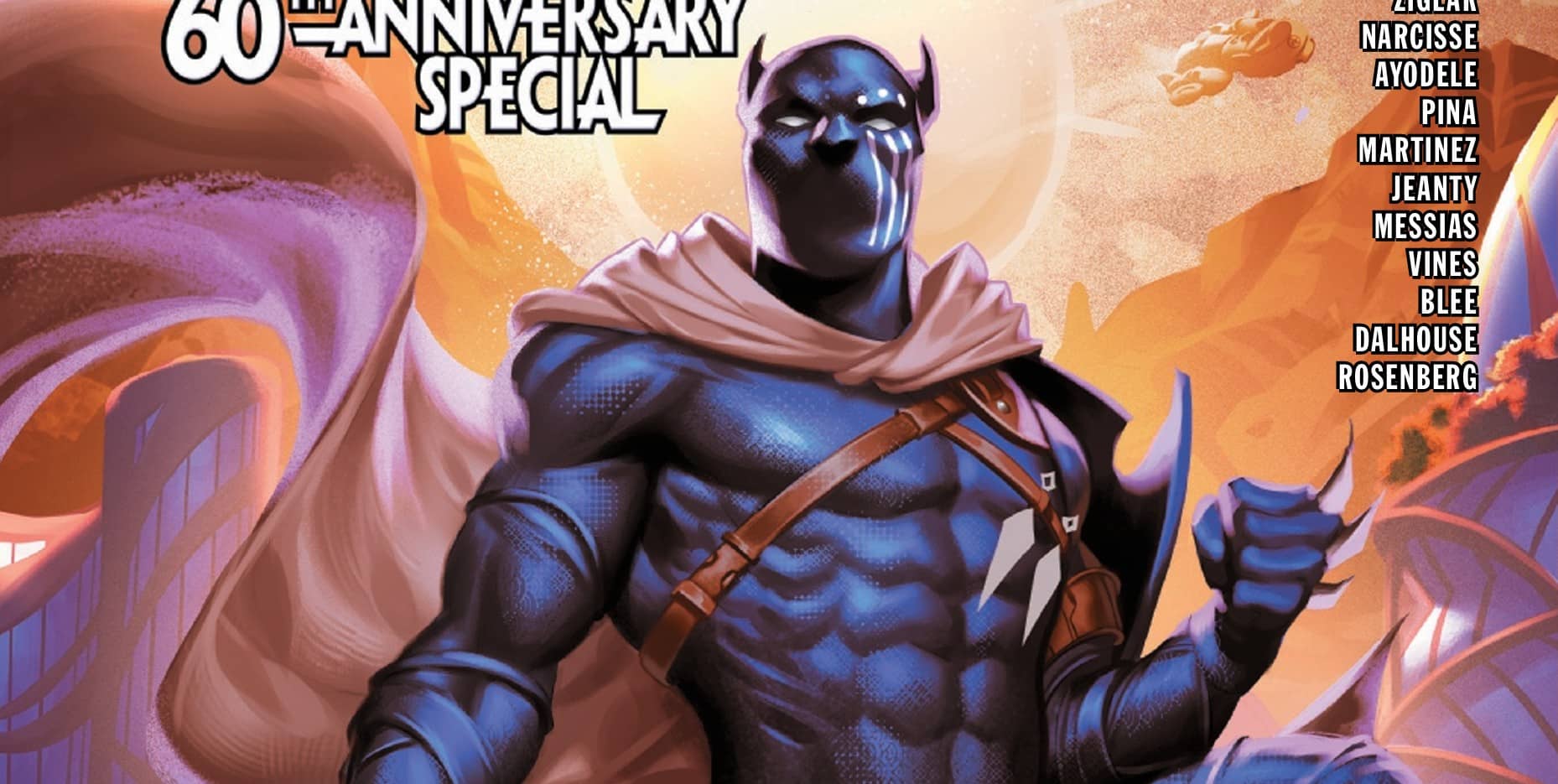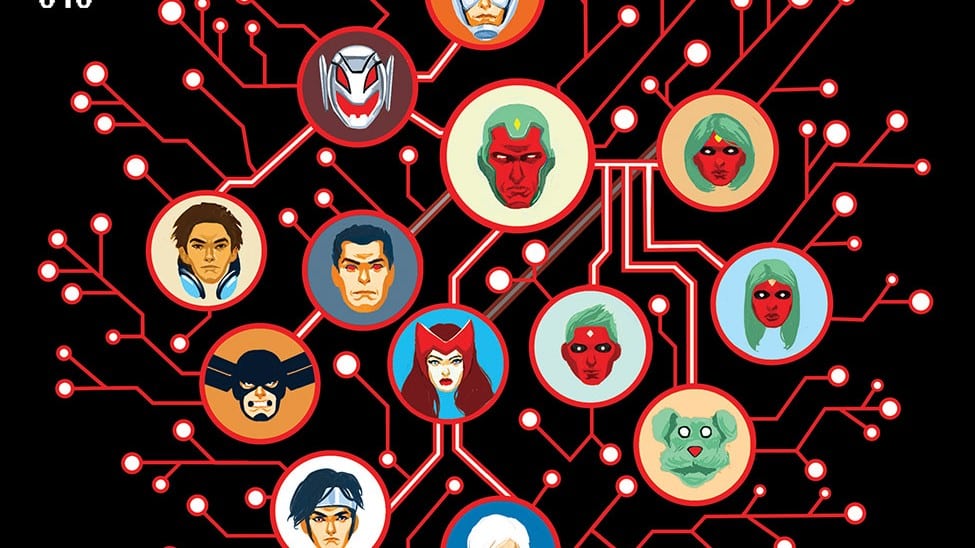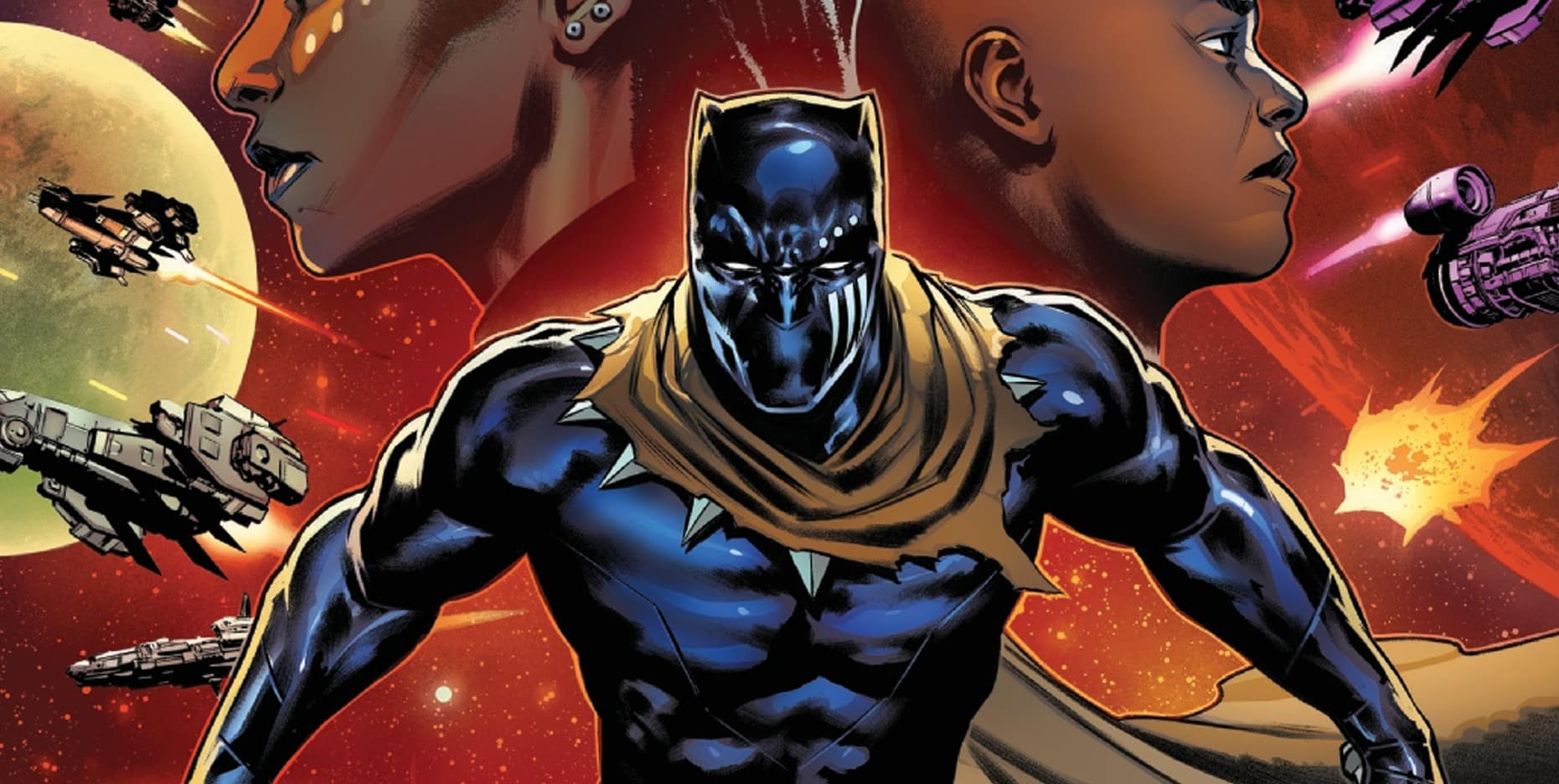The meaning of death, the politics of immortality, and the determination of identity are on the table in X-Men Red #4, written by Al Ewing, drawn by Juann Cabal, Andrés Genolet & Michael Sta. Maria, colored by Federico Blee, and lettered by Ariana Maher.
Jude Jones: Man, it feels like we were just here a few weeks ago. Wait, we *were* here just a few weeks ago. But that’s fine with me. This is good. Great. And if I only have to wait weeks between printings, then I’m not going to complain.
Vishal Gullapalli: Yeah, I am absolutely ecstatic to get another issue so soon after the previous one’s incredible conclusion, and it’s not like we have to wait overlong for #5 after this either – just 5 weeks and we’re back on schedule.
Jude: A lot is going on in X-Men Red #4, and rather than prattle on with a preamble, I’d rather just get to the meat of the matters. There are three main story threads here: of Magneto and the council, of Storm and the Shi’ar, and of Roberto and Rockslide(ish). Rather than give a linear retelling of the story, I think it’s best to focus on what’s happening in each tranche, and how that tranche relates to the whole.
Ok?
Vishal: Ok!
Jude: Let’s get into it, starting with my hero, the always right Magneto.
A Life That Ends

Jude: The Krakoans are immortal. They can be brought back from the most benign – or horrible of deaths. But is that a good thing? Is that even a desirable thing? For the Arakkii, it’s not. They’ve seen resurrection for years, under the blade of the White Sword. Coming back is nothing special, and, as Ora Serratta notes, not desirable.
Once you die, you’re off the council for good. Even if you could be brought back to life, you won’t be brought back to the council, which means even a resurrected Tarn or Nameless can never reclaim their seats. (Good!)
So as Magneto and Isca – fresh off her win(?) against Roberto – throw petty barbs, the question remains: what does life mean when you’re insulated from death? What does winning mean when you’re insulated from losing?
Vishal: I do wonder, though, are they barred from ever reclaiming their seat? Should Tarn be resurrected through some schemes, could he potentially challenge Magneto for his seat back? Or is he barred from ever holding “office” again? I ask this not to poke at an inconsistency but more out of curiosity of the mechanics. The intent certainly seems to be what you’ve said, but I wonder if someone as honorless as Tarn would listen to intent given the opportunity to exact his revenge. Curious.
Regardless, you’re right. For all intents and purposes, death is the end of your ability to guide Arakko and its mutants. Which matters! Especially in contrast with Krakoa, which has had several of its council members perish only to be resurrected without issue. And it kind of relates to the controversial Way of X, which you brilliantly wrote about as it was running – specifically the idea that immortality is something that could really change the nature of the people in possession of it. While its execution and conclusion on that point left much to be desired, the point is something I feel holds value when looking at Krakoan society. Is there any mechanism on Krakoa that could remove a member of the Quiet Council outside of their own resignation? Could anyone force Charles Xavier to leave the council?
There are three vital questions to ask those in power (courtesy of Optimus Prime):
- In whose interests do you exercise your power?
- To whom are you accountable?
- How can we get rid of you?
The answers are a bit nebulous on Krakoa: Xavier would respond to the first question with “The Krakoan people”, while Mystique or Sinister would probably have a very different answer. And I don’t know that there’s really an answer to the latter two questions.
Meanwhile on Arakko, the answers are clear. The Great Ring exercises their power in the interests of the Arakkii people. They are accountable to those same Arakkii people. And the Arakkii people can get rid of them by defeating them. As unfamiliar as their society can be, its power structure seems to be a lot more transparent and trustworthy than their Krakoan counterparts.
So naturally, there’s concern from the native Arakkii that the Krakoans may not understand or reflect this structure and its values.
Jude: That Isca still has fidelity to her sister (the one she sold out!) is telling. That she wants to take leave away from Mars is forbidding.
But those are seeds for another story, another day. Today we ask: can the eternal Krakoans serve on the council? And the answer is, well, no.
In a shocking but not at all surprising move, Magneto crushes his and Storm’s memory backups. They are now, effectively (“effectively”) mortal. Sure, the Scarlet Witch could bring them back vis a vis Legion…but that’s only if they want to come back.
And Magneto, at the seat of loss, still sour and sore from the years of losses that pushed him from Earth, has no more desire to be resurrected. He still desires a fight, of course, but he does not desire to live forever. He’s seen it drive Moria insane; he fears what endless chances would drive him to do.
Death doesn’t scare him. Eternity does.
What do you think about his logic?
Vishal: Magneto’s monologue outlining his thought process and views on the idea of death are in the running for the best Magneto writing ever. It pulls on his entire history, making it so clear that Magneto is not Xavier – he hates himself and fears himself in a way his longtime companion never could. He not only tries to hold himself accountable, he actively forgoes the benefits that Charles is taking full advantage of. Magneto. He (and Storm) are fully signing onto Arakko’s system – not trying to change the people or subjugate them (as Brand would love to accuse them of), but to be of them.
Jude: Storm’s thought process wasn’t shared here, but remember in Giant-Sized X-Men Storm: she had a transmode-like virus that was killing her. She easily could have just died, or been killed, and immediately resurrected. But she chose to live. Life was precious to her, and the idea or resurrection, it seemed, bastardized that which she valued.
Besides, she, like Magneto, respects the people they’re trying to protect. Giving up eternal life for respect is an even trade to them.
(Even if, unbeknownst to them, there’s a satellite system secretly downloading their consciousness without their knowledge. Because let’s just be real, no matter what happens, there’s no way Storm and Magneto are going to ever really die.)
Vishal: Oh, of course. The characters in fiction may no longer be immortal, but we all know that they are and always will be in reality.
Love and Light

Jude: Shi’ar have assembled the leadership of the galaxy to Arrako to discuss an important diplomatic issue and, well look at that, the Intergalactic Empire of Wakanda still stands. In John Ridley’s Black Panther, the galactic focus of Ta-Nehisi Coates’ run has been greatly distilled, for better (more, faster action, witty dialogue) and for worse – the worse being spelled out in this page. It’s seems T’Challa’s involvement in the empire may soon fall off (“transitional phase”) which, as a fan of Afrofuturism and all of the glorious stories that could be told about a powerful, self-aware, Black-led space collective, is unsurprising at best and demoralizing at worst. There is so much untapped material in the “out there,” and to see T’Challa brought back to Earth is an unnecessary regression.
And of regressions! The lack of character growth has been my biggest issue with Ridley’s Panther run. The self-aware, humbled T’Challa was replaced with this more arrogant, dismissive, manipulative one. This, again, may be more inline with previous incarnations of the character, but it just feels like such an unnecessary revision. His treatment of Storm – which she rightly calls out – seems to put the death knell in their relationship. In the current Panther run, he’s lied to her repeatedly as he’s lost control of his country. Granted, she’s still (apparently?) has/is going to help him (it’s unclear when this happens in relation to where we are in Black Panther), but the love and counsel from Storm that was such a lynchpin of the previous run seems to be gone for good.
Is she right to feel as she should? Absolutely, and Ewing does a good job of integrating another writer’s thoughts and desires. But do I think it’s right that T’Challa is being limited to Earth, separated from leadership of the Avengers, and will likely soon be stripped of his intergalactic empire?
Nah son.
Honestly? I kind of wish Ewing was writing Black Panther. He clearly has an affinity for expansive space stories, and he’s written BP before. Clearly there’s a reason he won’t, and I get it (hire Black people!), but here’s hoping someone who likes character and universal expansion takes the helm next go round.
Vishal: I am a big fan of the duality of T’Challa – he’s a man who wants to be a hero, would love nothing more than to be one, but feels he cannot, out of duty. I love when he does things hurtful to his friends (who generally are heroes) because of his duties as a king. But I agree – Ridley’s almost immediate reversion of where Coates left him as a character feels wrong, even if I do enjoy this as a separate entity.
Alas, the Marvel Machine marches on.
Ewing does a great job integrating the recent developments in Ridley’s run, and reminds us once again that he might be the single best writer of Marvel comics as an entity – every story feels like it matters to what he’s writing, but never overbearingly so. He specifically writes the current iterations of each character, but infuses them with so much history, often more than their solo writers tend to. In just a page, he makes me believe in the current status quo of T’Challa and Storm, even more than the actual writer of the current Black Panther series.
Jude: In any case, the assemblage of empires has a purpose: to inform them that Xandra, leader of the Shi’ar (and daughter of Charles Xavier) is dead. If you’ve been reading Marauders then you’ve already seen the death on-panel, and oh what a gruesome death it was. Again, Ewing seamlessly weaves in threads from other comics, making these worlds feel interconnected. And that this weaving can take place during a time when shipping delays make comic release schedules a guess, at best, in our world? Really quite amazing.
Vishal: It’s really remarkable how well Ewing manages to make Marauders feel important. I’m reading Marauders, and I’m enjoying the book, but even though Xandra just died, it felt so much less monumental than it does in X-Men Red #4.
I think there’s also an interesting parallel – the last time an event (a death, speficially) in one book had effects on another, it was Charles Xavier’s death in X-Force #1 reflecting in X-Men, Marauders, and pretty much the entire rest of the line – and he was resurrected within a couple months. Now it happens again – a major death in one book affecting another, and it’s Xavier’s daughter Xandra. The Xavier line will seemingly always have that effect on the franchise named after him.
Jude: As the death of a leader means war – and the possible death of trillions – is imminent, T’Challa raises a question: since Xandra is almost certainly a mutant, why not just resurrect her before anyone else finds out she’s died? Orbis Stellaris objects to the idea with an honestly good rationale (why is she special? Why does she deserve to rule forever? Who will this benefit?). The problem with this rationale is, of course, that it’s completely not genuine at all – Orbis is a weapons dealer, and a war would clearly be profitable for their line of war toys (toys that have been Storm-tested and Abigail Brand-approved).
Nova, surprisingly, supports the idea. He doesn’t like immortality, because he believes that it’s a false hope – everyone dies in the long run. But if an extension of life will extend life for billions in the short term, then why not? In fact, why hasn’t it already been done?
To which Storm answers in her most Ozymandias tone: it’s already done.
Xandra’s death cry, heard by psychics galaxy wide, was really her transferring her essence directly to Charles, who immediately started the process of her resurrection. In a stunning display of confidence, Storm notes that the mutants do not need permission to act on behalf of their own. That they will do what is necessary for the betterment of their people on their own terms, always.
This could, of course, be seen as a threat to some, maybe threatening to others. Some might even see it as inconsistent with the decision to destroy her and Magneto’s ability to be resurrected – why should she not be held to the same standard to which they’re holding themselves?
The answer lies in the idea of managing the greater good. To be good, equitable leaders of Arakko, they have to abide by the rules of the Arakkii, and those rules mean death is permanent. But to save the lives of trillions in another context, one death has to be reversed. This is inconsistent, yes, but it’s pragmatic, and pragmatism, along with empathy, are the characteristics of a good leader.
Storm is a great leader.
Vishal: I really just want to say that it feels great having Ewing writing Richard Rider again. His Guardians of the Galaxy run ended criminally soon, and I’ve really missed his voice for all these characters, but Nova in particular was something special under his pen. The way he writes Rich’s long-seeded trauma and guilt over all of the atrocities he’s witnessed and been unable to prevent, as well as the times he’s died (or just about) only for his sacrifice to mean nothing, it’s maybe my favorite writer-character pairing today. Of course he’d be for resurrection. Of course he’d have already done it.
And of course, for almost the exact same reasons, Ororo has. God, I love this book.
To your point about the potential hypocrisy in Ororo’s decision – Xandra is not Arakkii, nor is she attempting to be one of them. The Shi’ar do not have the same specific power structure of the Arakkii, nor should they. Different societies should govern themselves differently, as best they can based on their own society – they should not be forced to adhere to another’s values. Storm, of course, already knows this.
Wrongslide

Jude: The most affecting of the three strands lies with Roberto’s resurrection, and his interaction with the reincarnated Rockslide. During “X of Swords”, Rockslide was killed in Otherworld, and Otherworld deaths are permanent-ish. The body can be revived, but the soul – the memories, the personality, the personhood – is lost forever. This Rockslide is an amalgamation of many possible (all possible?) Rockslides. He is not Santo, as he tells Roberto. He is someone else.
Who is that? Rockslide isn’t quite sure.
Vishal: The previous two threads were incredibly important to the greater plot of the series, and to the line as a whole. Yet this one is the one that stood out to me as something special. The consequences of Rockslide’s death in Otherworld were briefly brought into focus in the criminally-cancelled X-Factor. But since then there’s been very little brought to the forefront, both about his peers’ response to his death and about the new Rockslide. What we get here, finally, is an exploration of life and death – what they mean, and how just maybe a permanent death doesn’t have to be the worst thing in the world.
Jude: That Rockslide, excuse me, Wrongslide, is pensive, thoughtful, poetic seems a far cry from his first iteration, where his words seemed to scare those who heard them. Maybe their perspective – their sadness at losing their friend – didn’t allow them to hear Wrongslide clearly; maybe Roberto is one of the first people to ask for his feelings and to receive them without fear.
Maybe dying gave Roberto a new perspective on what renewal and living truly means. In whatever case, Wrongslide’s self aware realization – as long as he’s here, people will only see the tombstone of a friend – is as sad as it is true. So Roberto’s invitation to the stars, while almost certainly self-serving (you know he’s got a plan going), still feels – is – a benefit and tribute to his now lost – and now new – friend.
And really, that’s the strand that connects all these disparate stories. Extensive planning. Thoughtfulness. Empathy for those they serve, be it a council or an empire or the visage of a deceased friend. The Brotherhood, no matter where they stand, stand for something, and they have no problems putting their cards on the table to advance the cause.
Vishal: Of course, there’s also the more obvious strand of life and death – what they mean, what their absence means, and the power that both have. From a societal standpoint (with Arakko), an inter-societal and political standpoint (with the Galaxy), and from a personal standpoint (with Wrongslide). In a line revitalized by the edict “No More Mutants Die”, this feels like a breath of even fresher air – death as a philosophy, as a concept to grapple with. I love this.
Again, Ewing is doing an amazing job, weaving stories he’s not writing into his narrative in a way that makes his narrative more engaging. X-Men Red #4 may not be your favorite issue of the series, but it is the issue that best illustrates why this is the best of the X-Books (yes, better than New Mutants. We can fight over this. Hand me a knife, Storm…)
X-Traneous Thoughts
- Seemingly, Nova’s sense that something is looming and Storm’s invitation to stay-or-arakko are connected to “Judgment Day”.
- Is Nova Sense a thing? Spidey should sue.
- There’s a panel during “X of Swords” where Bei calls out Isca for being, essentially, lonely and sad behind all of her bluster. I think about that often. I thought about that here.
- Roberto really is Magneto’s student
- I’m pretty sure the line about T’Challa being a hologram was added at the last minute for continuity. Proof? The coloring of T’Challa is pretty inconsistent throughout, going from greenish, to normal coloring to someplace in between. I could be wrong, and ultimately it’s not story significant.
- I’m 100% sure Storm knows Orchis has been trying to kill her and her team.

